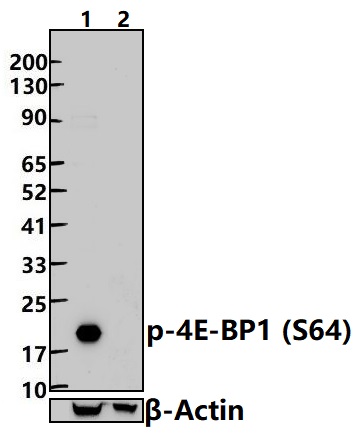Product Name :
4E-BP1 (Phospho-Ser64) polyclonal antibody Background :
Translation repressor protein 4E-BP1 (also known as PHAS-1) inhibits cap-dependent translation by binding to the translation initiation factor eIF4E. Hyperphosphorylation of 4E-BP1 disrupts this interaction and results in activation of cap-dependent translation. Both the PI3 kinase/Akt pathway and FRAP/mTOR kinase regulate 4E-BP1 activity. Multiple 4E-BP1 residues are phosphorylated in vivo. While phosphorylation by FRAP/mTOR at Thr37 and Thr46 does not prevent the binding of 4E-BP1 to eIF4E, it is thought to prime 4E-BP1 for subsequent phosphorylation at Ser65 and Thr70. Product :
Rabbit IgG, 1mg/ml in PBS with 0.02% sodium azide, 50% glycerol, pH7.2. Storage&Stability :
Store at 4°C short term. Aliquot and store at -20°C long term. Avoid freeze-thaw cycles. Specificity :
4E-BP1 (Phospho-Ser64) polyclonal antibody detects endogenous levels of 4E-BP1 protein only when phosphorylated at Ser64. Immunogen :
Synthetic phosphopeptide derived from human 4E-BP1 around the phosphorylation site of Serine 64. Conjugate :
Unconjugated Modification :
Phosphorylated
4E-BP1 (Phospho-Ser64) polyclonal antibody Background :
Translation repressor protein 4E-BP1 (also known as PHAS-1) inhibits cap-dependent translation by binding to the translation initiation factor eIF4E. Hyperphosphorylation of 4E-BP1 disrupts this interaction and results in activation of cap-dependent translation. Both the PI3 kinase/Akt pathway and FRAP/mTOR kinase regulate 4E-BP1 activity. Multiple 4E-BP1 residues are phosphorylated in vivo. While phosphorylation by FRAP/mTOR at Thr37 and Thr46 does not prevent the binding of 4E-BP1 to eIF4E, it is thought to prime 4E-BP1 for subsequent phosphorylation at Ser65 and Thr70. Product :
Rabbit IgG, 1mg/ml in PBS with 0.02% sodium azide, 50% glycerol, pH7.2. Storage&Stability :
Store at 4°C short term. Aliquot and store at -20°C long term. Avoid freeze-thaw cycles. Specificity :
4E-BP1 (Phospho-Ser64) polyclonal antibody detects endogenous levels of 4E-BP1 protein only when phosphorylated at Ser64. Immunogen :
Synthetic phosphopeptide derived from human 4E-BP1 around the phosphorylation site of Serine 64. Conjugate :
Unconjugated Modification :
Phosphorylated
-
 Western blot (WB) analysis of 4E-BP1 (Phospho-Ser64) polyclonal antibody at 1:500 dilution Lane1:MCF-7 whole cell lysate(30ug) Lane2:MCF-7 treated with λ-phosphatase whole cell lysate(30ug)
Western blot (WB) analysis of 4E-BP1 (Phospho-Ser64) polyclonal antibody at 1:500 dilution Lane1:MCF-7 whole cell lysate(30ug) Lane2:MCF-7 treated with λ-phosphatase whole cell lysate(30ug)
Bioworld Biotech only provide peptides for our antibodies and do not provide additional peptide customization services.
Price/Size :
USD 368/1mg/vial
Tips:
For phospho antibody, we provide phospho peptide(0.5mg) and non-phospho peptide(0.5mg).Describe :
Blocking peptides are peptides that bind specifically to the target antibody and block antibody binding. These peptide usually contains the epitope recognized by the antibody. Antibodies bound to the blocking peptide no longer bind to the epitope on the target protein. This mechanism is useful when non-specific binding is an issue, for example, in Western blotting (WB) and Immunohistochemistry (IHC). By comparing the staining from the blocked antibody versus the antibody alone, one can see which staining is specific; Specific binding will be absent from the western blot or IHC performed with the neutralized antibody.Formula:
Synthetic peptide was lyophilized with 100% acetonitrile and is supplied as a powder. Reconstitute with 0.1 ml DI water for a final concentration of 10 mg/ml.The purity is >90%,tested by HPLC and MS.
Storage:
The freeze-dried powder is more stable. For short time at 2-8°C. For long term storage store at -20°C.
Note :
This product is for research use only (RUO only). Not for use in diagnostic or therapeutic procedures.
 4E-BP1 (Phospho-Ser64) polyclonal antibody
4E-BP1 (Phospho-Ser64) polyclonal antibody  Datasheet
Datasheet COA
COA MSDS
MSDS SHIP
SHIP